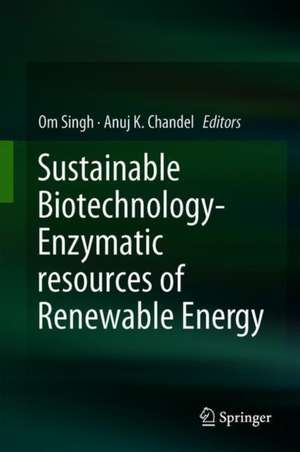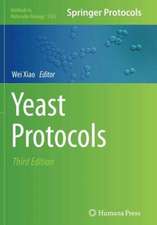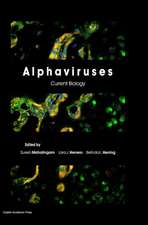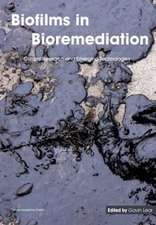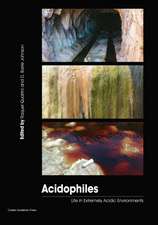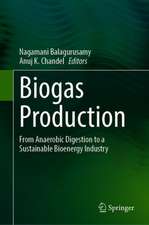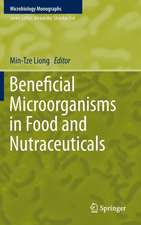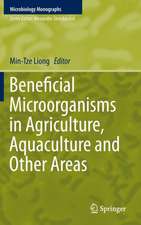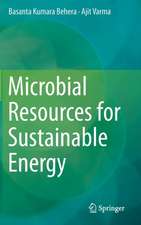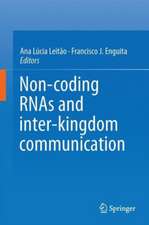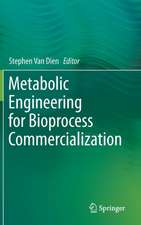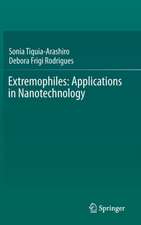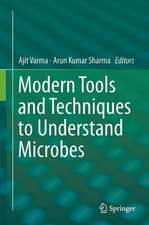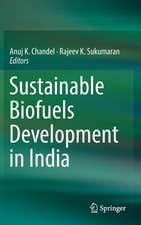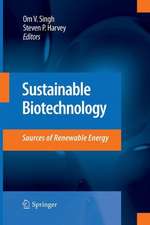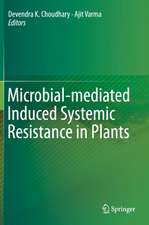Sustainable Biotechnology- Enzymatic Resources of Renewable Energy
Editat de Om V. Singh, Anuj K. Chandelen Limba Engleză Hardback – 26 sep 2018
| Toate formatele și edițiile | Preț | Express |
|---|---|---|
| Paperback (1) | 576.11 lei 38-44 zile | |
| Springer International Publishing – 25 ian 2019 | 576.11 lei 38-44 zile | |
| Hardback (1) | 659.70 lei 22-36 zile | |
| Springer International Publishing – 26 sep 2018 | 659.70 lei 22-36 zile |
Preț: 659.70 lei
Preț vechi: 776.13 lei
-15% Nou
Puncte Express: 990
Preț estimativ în valută:
126.24€ • 132.13$ • 105.07£
126.24€ • 132.13$ • 105.07£
Carte disponibilă
Livrare economică 10-24 martie
Preluare comenzi: 021 569.72.76
Specificații
ISBN-13: 9783319954790
ISBN-10: 3319954792
Pagini: 495
Ilustrații: XII, 476 p. 65 illus., 45 illus. in color.
Dimensiuni: 155 x 235 mm
Greutate: 0.95 kg
Ediția:1st ed. 2018
Editura: Springer International Publishing
Colecția Springer
Locul publicării:Cham, Switzerland
ISBN-10: 3319954792
Pagini: 495
Ilustrații: XII, 476 p. 65 illus., 45 illus. in color.
Dimensiuni: 155 x 235 mm
Greutate: 0.95 kg
Ediția:1st ed. 2018
Editura: Springer International Publishing
Colecția Springer
Locul publicării:Cham, Switzerland
Cuprins
1. Introduction.- 2. Role of Systematic Biology in Biorefining of Lignocellulosic Residues for Biofuels and Chemicals Production.- 3. Biotechnological advancements in cellulosic ethanol production.- 4. Sustainable production of biofuels from weedy biomass and other unconventional lignocellulose wastes.- 5. Technological Aspects of lignocellulose conversion into biofuels: Key challenges and practical solutions.- 6. Beyond ethanol: Contribution of various bioproducts to enhance the viability of biorefineries.- 7. Real Techno-economic assessment of bioethanol production from major lignocellulosic residues under different process configurations.- 8. Lignocellulolytic Enzymes from Thermophiles.- 9. Application of enzymes in Sustainable liquid transportation fuels production.- 10. The Realm of Lipases in Biodiesel Production.- 11. Nanotechnology- based developments in biofuel production: Current trends and applications.- 12. Ester-based biofuels from wastes.- 13. Sustainable production of biogas from renewable sources: global overview, scale up opportunities and potential market trends.- 14. Microbially Originated Polyhydroxyalkanoate (PHA) Biopolymers: An Insight into the Molecular Mechanism and Biogenesis of PHA Granules.- 15. Biopolymer Synthesis and Biodegradation.- 16. The application of microbial consortia in a biorefinery context: understanding the importance of artificial lichens.- 17. Green microalgae as substrate for producing biofuels and chlorophyll in biorefineries.- 18. Future perspectives and potential applications of enzymes in sericulture.- index.
Notă biografică
Om V. Singh is a Senior Scientific Consultant at the Technology Science Group (TSG) in Washington, DC, USA. Prior to joining the TSG, he served at the US Food and Drug Administration’s (FDA) Center for Devices and Radiological Health (CDRH), where he advised companies on anticipated regulatory pathways when seeking approval and registration for their human health products.
Om holds a BSc and MSc in biological sciences, and a PhD in microbial biotechnology with an emphasis on exploring microbial wealth for value added products of commercial significance. While completing his postdoctoral studies at the Johns Hopkins School of Medicine, he also obtained a second Master’s degree (MS) in regulatory affairs in life sciences from Johns Hopkins University. He has been an Associate Professor of Microbiology at the University of Pittsburgh, Bradford. Om’s research has centered on exploring the wealth of extremophiles in the medicine and bioenergy sector. He haspublished numerous peer-reviewed research articles and book chapters, and has edited a number of books and special issues of peer-reviewed research journals. Currently, at the TSG Om is employing his deep understanding of regulatory affairs and hands-on experience in microbiology research to guide companies regarding the standards and overall system requirements needed to demonstrate the safety and efficacy of their medical devices.
Dr. Anuj K. Chandel is a USP-CAPES Visiting Researcher and Professor of Industrial Biotechnology at the Engineering School of Lorena, University of Sao Paulo (USP), Brazil. Before joining USP-Lorena, Dr. Chandel worked as a Lead Scientist at the Sugarcane Technology Centre (CTC)-Piracicaba, Brazil, where he was responsible for the deployment of cellulosic ethanol processes at demonstration plants and scale-up activities. He has 17 years of research experience working in industries and universities on industrial enzymeproduction, biomass valorization, biofuel production and membrane-based separations. He has published 55 articles in peer-reviewed journals and 28 book chapters. He has also co-edited seven books on Xylitol Production, Sustainable Degradation of Lignocellulosic Biomass, Brazilian Biofuels Development, Indian Biofuels Development, Extremophiles, Sugarcane Biorefineries and Enzymatic Resources of Renewable Energy.
His contributions span the biomass science, biotechnology, and policy domains, and include the sustainable development of biofuels and renewable chemicals using biorefinery concepts. He is also a frequently invited presenter on the technical and strategic aspects of biomass energy and biochemicals, in prominent forums and at international conferences.
Om holds a BSc and MSc in biological sciences, and a PhD in microbial biotechnology with an emphasis on exploring microbial wealth for value added products of commercial significance. While completing his postdoctoral studies at the Johns Hopkins School of Medicine, he also obtained a second Master’s degree (MS) in regulatory affairs in life sciences from Johns Hopkins University. He has been an Associate Professor of Microbiology at the University of Pittsburgh, Bradford. Om’s research has centered on exploring the wealth of extremophiles in the medicine and bioenergy sector. He haspublished numerous peer-reviewed research articles and book chapters, and has edited a number of books and special issues of peer-reviewed research journals. Currently, at the TSG Om is employing his deep understanding of regulatory affairs and hands-on experience in microbiology research to guide companies regarding the standards and overall system requirements needed to demonstrate the safety and efficacy of their medical devices.
Dr. Anuj K. Chandel is a USP-CAPES Visiting Researcher and Professor of Industrial Biotechnology at the Engineering School of Lorena, University of Sao Paulo (USP), Brazil. Before joining USP-Lorena, Dr. Chandel worked as a Lead Scientist at the Sugarcane Technology Centre (CTC)-Piracicaba, Brazil, where he was responsible for the deployment of cellulosic ethanol processes at demonstration plants and scale-up activities. He has 17 years of research experience working in industries and universities on industrial enzymeproduction, biomass valorization, biofuel production and membrane-based separations. He has published 55 articles in peer-reviewed journals and 28 book chapters. He has also co-edited seven books on Xylitol Production, Sustainable Degradation of Lignocellulosic Biomass, Brazilian Biofuels Development, Indian Biofuels Development, Extremophiles, Sugarcane Biorefineries and Enzymatic Resources of Renewable Energy.
His contributions span the biomass science, biotechnology, and policy domains, and include the sustainable development of biofuels and renewable chemicals using biorefinery concepts. He is also a frequently invited presenter on the technical and strategic aspects of biomass energy and biochemicals, in prominent forums and at international conferences.
Textul de pe ultima copertă
Nature offers abundant renewable resources that can be used to partially replace fossil fuels and commodity chemicals but issues of cost, technology readiness levels, and compatibility with existing distribution networks remain huge challenges. Cellulosic ethanol and biodiesel are the most immediately obvious target fuels, with hydrogen, methane and butanol as other potentially viable products. This book continues to bridge the technology gap and focus on critical aspects of lignocellulosic biomolecules and the respective mechanisms regulating their bioconversion to liquid fuels into energy and value-added products of industrial significance. This book is a collection of reviews elucidating several broad-ranging areas of progress and challenges in the utilization of sustainable resources of renewable energy, especially in biofuels. This book comes just at a time when government and industries are accelerating their efforts in the exploration of alternative energy resources, with expectations of the establishment of long-term sustainable alternatives to petroleum-based liquid fuels. Apart from liquid fuel this book also emphasizes the use of sustainable resources for value-added products, which may help in revitalizing the biotechnology industry at a broader scale. This book also provides a comprehensive review of basic literature and advance research methodologies to graduate students studying environmental microbiology, chemical engineering, bio-economy and microbial biotechnology.
Caracteristici
Aims to propose microbial enzymes on variety of lignocellulosic crops Offers detection strategies to screen and identify the variety of lignocellulosic microorganisms from extreme environmental conditions Unique literature review of weedy lignicellulosic substrate
